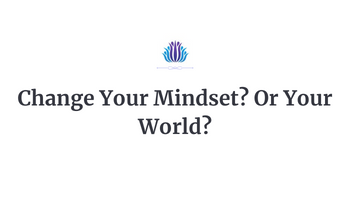According to yogic philosophies…one of the best parts about being a human is that you can learn to adapt to just about anything. But of course…the knife slices both ways. As it turns out, one of the worst parts about being a human is that you can learn to adapt to just about anything.
So far as I can tell, this is the star around which all our greatest challenges gravitate. It just surfaces in different ways depending on where you fall in the spectrum.
Some of us are putting up with negative situations we could get out of. But we choose not to because we are “used” to it. It’s “fine.” We adapt to negative situations because, after all…the devil you know is better than the devil you don’t, right?
Others of us are on the other end of the spectrum. We are never satisfied. Always striving. “Good” is never “good enough” and “better” is always the enemy of “best.” We push to get a promotion, get it…and then find ourselves pushing to climb further up the ladder, still. We get a new car and find the high of that transaction dwindles after only a few months grace period. We fall in love and believe we found “the one!” only to grumble at their complete unwillingness to put the damn cap back on the toothpaste tube. (After all, is it really that hard?”) only a few months later.
There is a term for this. It’s called the Hedonic Treadmill. It reasons that no matter how good or bad an event is in your life, in the long term, you will likely fall back into your baseline level of happiness.
It is the name we give to our quicksilver rate of adaptation. No matter how extraordinary the thing you earn, achieve, win, or receive, you will ultimately return to your baseline level of happiness. No matter the tragedy that befalls you, you will likely return to your baseline. As long as our brain is basically intact, we boomerang back.
This begs a few questions…
Question 1: How do we avoid “adapting” to (or “taking for granted”) the good things in our lives?
I have fallen in love. How do I keep that love and connection intact? How do I avoid crashing into the reality of this new person and, instead, continue to embrace him/her….warts and all? How do I keep my appreciation for that fancy new job I just got long after I have learned the ropes and its shine has lost its luster?
Can it even be done?
According to research, it can. And it requires, mostly, habits.
If ever-lasting contentment is what you seek, the trick is to make a practice out of the following:
- Nurturing close relationships:
- Those who are able to keep their happiness levels high do so with help. Shawn Achor calls this the “super-bounce” effect. He names it after the experience you have on a trampoline. You can bounce high on your own, but if you want a SUPER bounce, you need to join in with another…and time it just right. So if you want to feel like you can continue to ride high without losing any elevation over time, it helps if you have others to assist you in your flight.
- Writing down three things to be grateful for every day.
- It takes 10 good things to happen to the average person to counter the effects of one bad thing. Think about it…when someone asks you how your day went, do you mention the coffee you ordered this morning that came out exactly as you ordered? Do you mention the car accident that you didn’t get in? Or do you mention the fight you had with a colleague at work? The brain is designed this way for a good reason. Survival. But in our current environment, it’s not really serving us very well. By writing down three things that you are grateful for every day, you can actually rewire your brain to look for what’s going right. You get a chance to see just how much abundance is really all around you. This affects your happiness score.
- Random acts of kindness toward others:
- It might sound woo-woo. But its not. Every time you perform an act of kindness toward another person, your brain produces feel-good hormones that can completely shift the trajectory of YOUR day along with theirs. So be selfish. Go out there and make someone’s day.
- Meditation:
- Practicing meditation helps you clear out the lens of your mind so everything looks a little less foggy. It also helps develop that part of the brain devoted to helping us with long term goals. Also…paying attention to nothing but your breath just feels nice. As little as 10 minutes every day can make a difference.
- Physical Exercise:
- It’s not just for jocks! Movement fires up endorphins and dopamine. It gives us that kick of “feel good!” that pays dividends throughout the day long after your exercise session is done. Much as with meditation…10 minutes each day can be enough to note a positive effect.
So yes…you can actually increase your baseline level of happiness IF you are willing to make it a habit.
Question 2: Is changing your mindset always the right thing to do? When does gratitude morph into complacency?
The hedonic treadmill isn’t just a mechanism for reducing our joy. It can also help us reduce our pain. We adjust to situations that are challenging and find ways to cope. That seems like a good thing, right? It means we have an emotional immune system that we can bolster, thereby improving our capacity for joy even in the most difficult circumstances.
But is that ever a problem?
I’m sure you have seen it. Your friend is trying to improve their mindset around a truly lousy job. The work environment is toxic and perpetually keeps people on their toes. But it’s better to have a lousy job than no job at all, right?
Or maybe a close friend of yours is in a relationship that you know isn’t healthy…but they keep “making the best of it.” Sure…I haven’t had sex with my partner in over 6 months. We barely even talk to each other anymore. But he isn’t beating me. I should be happy with what I got, right?
And on a macro scale, you can see it in politics. You see masses of people condone atrocious behavior from politicians or dictators because “that’s just the way it is” and “we can’t do anything about it, so lets just ignore it.”
Surely there must be a point where merely changing our mindset isn’t the best option anymore…right? Isn’t there a place where changing our circumstances might be helpful. Crucial, even?
It boils down to this very simple concept: discernment
There are times when you will need to persevere in extraordinarily challenging circumstances. There is no opt-out option. There is no bird you can flip to your environment while you skip away toward the horizon. You just have to make it through. In times such as those, having the skills to improve your mindset around your situation can be tremendously helpful. It can act life a life-saver in an ocean storm. Sure – it’s not going to stop the waves. But at LEAST it will help you keep afloat long enough at each interval to gasp for air and ride the storm.
BUT…
Sometimes, the better move is simply get your butt out of the water. Even if you have to take every ounce of effort left in you, your best move MIGHT be to swim for your life toward the far-away shore. Think about it – wouldn’t it be much easier to breathe if you weren’t so busy keeping yourself from drowning?
Sure – you can meditate, exercise, eat well, and think happy thoughts. That MIGHT fuel you back up juuuuuust enough to get through another work day. Or maybe you could find another job and discover that you don’t need to implement quite so many practices just to stay afloat. Maybe instead, those practices will help you fly.
So how do you know which is the right one to use? When is it better to change your mindset around your situation and when is it right to change the situation, itself.
The answer is….well actually its a trick question. The answer is BOTH.
If you want to live your best life, you are going to need to implement habits that feed you. It’s never going to hurt you to be grateful. It’s never going to cause you harm to perform an act of kindness It’s never going to be a bad idea to meditate. Doing all of those things helps to give you that ability to practice DISCERNMENT. You can better see all your options when you’re firing optimally.
Often, when people begin a practice that is aimed to help their mindset, they ultimately DO end up making some pretty big life changes. They realize, after eating well and moving their bodies just how GOOD it feels when they aren’t eating sugar at ever turn and when they aren’t sitting 8 straight hours a day. After practicing gratitude, they realize just how many options are out there and hey…what’s the harm in giving it a shot? It’s not going to hurt. After all – my life is pretty good as it is. Let’s just see what we can do!
In other words, the goal isn’t to choose between changing your mindset and changing your environment. Rather, the goal is to do your best to appreciate all the gifts you have right now, and continue to offer gratitude for them even as you move to improve your life. Because life is going to change. The question isn’t whether, but HOW.
Let’s go back to that analogy of you bobbing in the ocean as the storm presses upon you. You cannot stop the storm. That’s going to happen with or without you. And you NEED a life saver to avoid drowning. That is going to come in the form of a mindset shift. But once you have gotten a chance to get a breath of air, your next step is probably to get onto a boat so that you can get out of the storm a little bit faster AND enjoy the ride a bit more while you’re doing it.
What are your life savers? What practices help you stay afloat when life gets hard?

